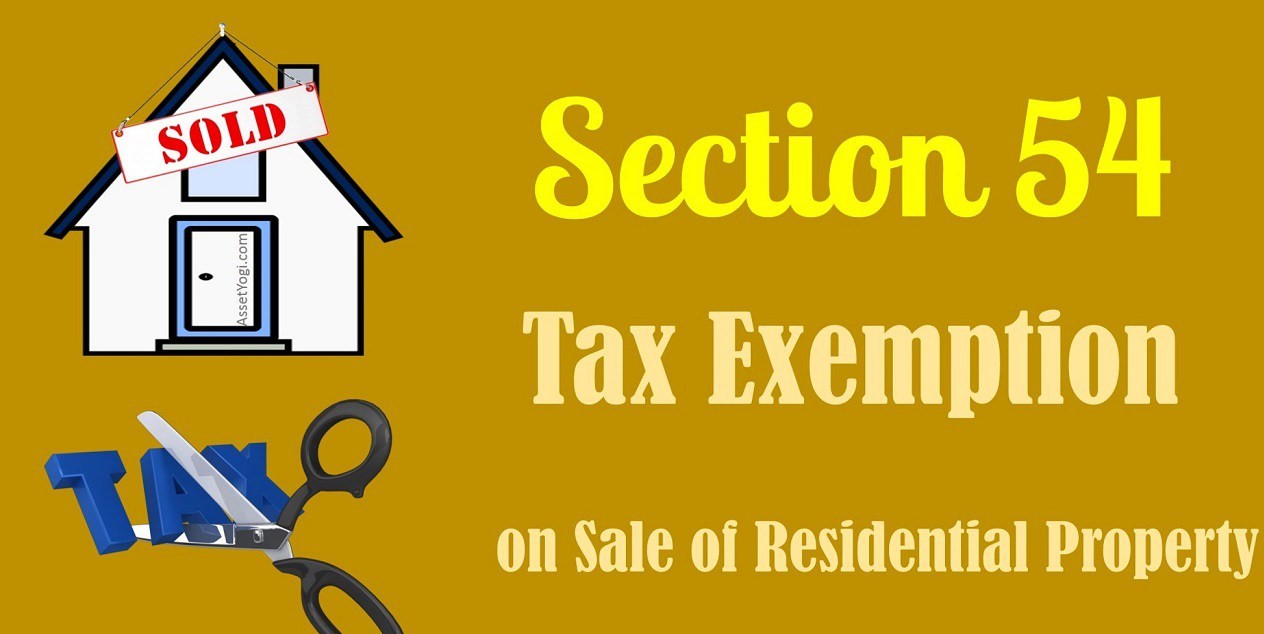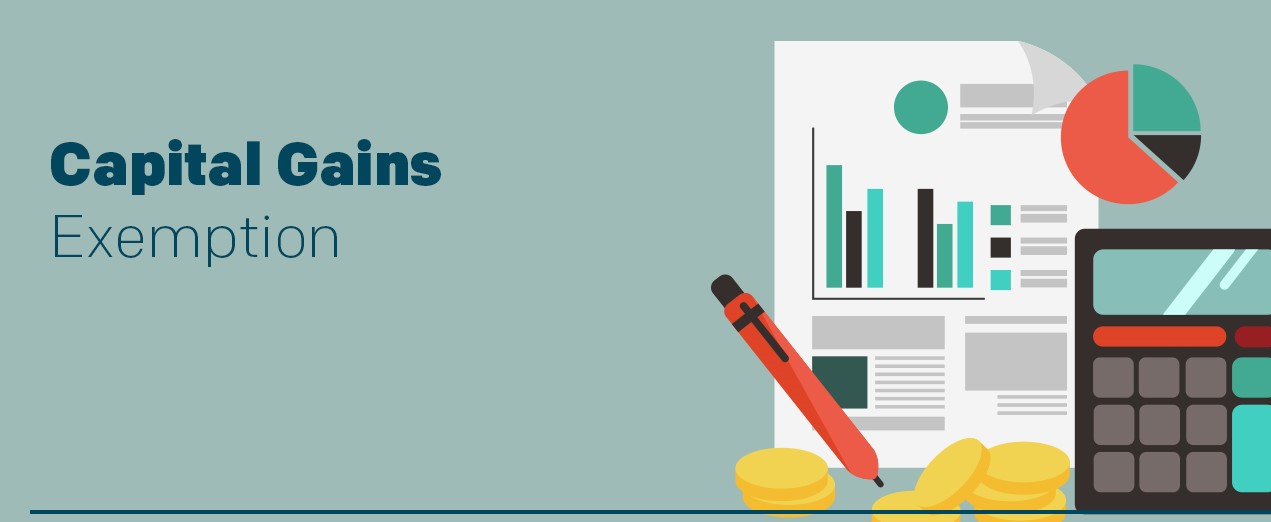Understanding Exemptions under Section 54, 54EC & 54F

Section 54 of the Income Tax Act, 1961 provides the seller of a residential property with relief from capital gains tax, if the proceeds from the sale are used to acquire another residential property. Know in detail about the Section 54 and Exemptions under Section 54, 54EC & 54F.

Section54, Section 54EC & Section 54F of Income Tax Act, 1961 explains regarding:
- Capital Gain Account Scheme,
- deduction on multiple sales and purchases of residential houses, capital gains arising from the sale of more than one house, however, the sale proceeds are invested in one house,
- exemption u/s- 54 / 54F / 54EC for acquisition of more than one house,
- exemption u/s -54 / 54F / 54EC for property purchased in the joint name with the wife, exemption for the purchase of property out of personal funds and on many more issues.
Capital Gain Account Scheme-
Under this scheme, the taxpayers have to deposit money with any nationalized Bank if proceeds from the sale of the residential property would not have been invested by the taxpayer at the time of filing the return. An Exemption is given to the Taxpayer on the basis of the amount deposited in the Bank and the actual investment.
However, in the case of multiple purchase and sale of residential houses, the exemption cannot be calculated on the basis of the aggregate of capital Gain and the aggregate of Investment in the residential houses. The combination which is beneficial to the assessee is allowed for the exemption.
Note: An Assessee is allowed for the exemption u/s 54 even if he sells more than one house in the same year and the capital gain is invested in a new residential house, provided other conditions are fulfilled.
Other conditions fulfilled if the assessee purchases more than one house out of the sale proceeds of one residential house, exemption u/s 54 can be claimed only in respect of one house.
Exemptions u/s 54/54F:
- Merely because sale deed is in joint name, the assessee could not be denied the benefit of deduction u/s 54. As per Section 54 F, it is not mandatory that a house should be purchased in the name of an assessee but it should be purchased by the assessee.
If the assessee is handicapped and he purchased a Property in the joint name with his wife for ‘shagun’ purpose and the whole consideration was paid by the assessee, then he is entitled to exemption u/s 54F.
- The Exemption u/s 54F is not allowed if the new residential property is purchased by the assessee in the name of his adopted son.
- Under Sec. 54, if the assessee is the owner of the property, he is entitled to get the exemption even if the new property is purchased in his wife name but it is assessed in the hands of the assessee.
- Section 54F includes only such residential house which is fully or wholly owned by one person and not a residential house owned by more than one person. If the assessee is a co-owner of another flat, he is not the absolute owner of another residential flat, and thus the exemption under section 54F can be denied.
- If before the expiry of the statutory period the assessee invested the amount of capital gain on sale of shares in the purchase of the flat, he can claim the benefit of deduction under section 54F on the ground that building was under construction stage and assessee had chosen to pay the entire amount in advance.
The Nexus between amount of investment and capital gain u/s 54 :
Under the provision of section 54, an Assessee is not required to establish the nexus between the amount of capital gain and the cost of a new asset.
[ CIT 130 TTJ (Mum) (UO) 108 (2010)Vs. Ishar Singh Chawla and Ajit Naswanit Vs. CIT 1127 Taxman 123 (Delhi) (Mag.) (2001)]: It was held that initially, that the assessee has utilized the sale proceeds on the sale of its residential flat in commercial properties and later on he purchased two residential flats during a period specified in sub-section (2) of section 54. Here the sale proceeds were utilized for the purchase of a commercial property and residential house was purchased out of the funds obtained from different sources, as such, the identity of heads has been changed.
Exemptions under section 54F/54EC :
- Under the Income Tax Act, the income of the minor has to be clubbed with the income of the parent{provisions of section 64(1A) }
A minor child can be treated as an Assesse under section 2(7) for the purpose of sec 54F where proceedings under Act for assessment of income of a minor child are required to be taken. The Benefit under section 54F cannot be denied to the minor child on the ground that father of a minor child has a residential house at the time of transfer of capital asset.
In the case of clubbing of income of the minor child, a deduction under section 54EC is to be allowed on minors’ income from LTCG separately and only net income is to be clubbed.
- An Assessee could not be denied the benefit of deduction u/s 54EC merely because the bonds are in the joint name. If the complete consideration has flown from the assessee, he is entitled to get the benefit.
- Under section 46(2), Capital Gains in the hand of shareholder on the distribution of assets by the company in liquidation is considered as a deemed transfer and not an actual transfer. It has specifically been taxed under that section.
Date of investment in respect of section 54EC
For the purposes of the provisions of Section 54EC, the date on which the payment was made and received by the National Housing Bank should be regarded as the date of investment by assessee [Hindustan Unilever Ltd. v. DCIT 191 Taxman 119 (Bom) [2010]]
Few frequently asked questions are:
The benefit under section 54EC and 54F can be taken simultaneously or not?
Deduction under section 54EC cannot be denied on the ground that assessee has availed exemption under section 54F also in respect of a part of capital gains. [ACIT vs Deepak S. Bheda[2012] 23 taxmann.com 159 (Mum.)]
Can the benefits u/s 54, 54F & 54EC are available from gains of the Depreciable capital asset?
It was held that the depreciable capital asset will be regarded as the Long Term Capital Asset if it is held for more than 36 months before its transfer, However, the gains or loss on Depreciable Capital Asset shall always be short term according to section 50(1)&50(2),
In the case of CIT V. Assam Petroleum Industries Pvt. Ltd. 131 Taxman 699 (GAU.) [2003], it was held that benefit u/s 54,54F & 54EC which are available from gains of an LTCA shall be available from gains of the Depreciable capital asset.


 ITAT Amritsar: No Section 269SS Violation for One-Time Cash Payment Before Sub-Registrar
ITAT Amritsar: No Section 269SS Violation for One-Time Cash Payment Before Sub-Registrar  Tax Officials Unleash Digital Dragnet: How New Raid Powers Redefine Privacy, Property Rights in India and likely to Fuel Corruption
Tax Officials Unleash Digital Dragnet: How New Raid Powers Redefine Privacy, Property Rights in India and likely to Fuel Corruption  Income Tax Department Rewards for Reporting Tax Evasion: A Comprehensive Guide
Income Tax Department Rewards for Reporting Tax Evasion: A Comprehensive Guide  Forfeiture of Gratuity by Employer- What are the Remedies for an employee- Can employer be challenged?
Forfeiture of Gratuity by Employer- What are the Remedies for an employee- Can employer be challenged?  Employer can forfeit gratuity of an employee in case of moral turpitude
Employer can forfeit gratuity of an employee in case of moral turpitude  Diving Deeper: The Impact of the New Tax Bill on Dairy and Farming Income
Diving Deeper: The Impact of the New Tax Bill on Dairy and Farming Income